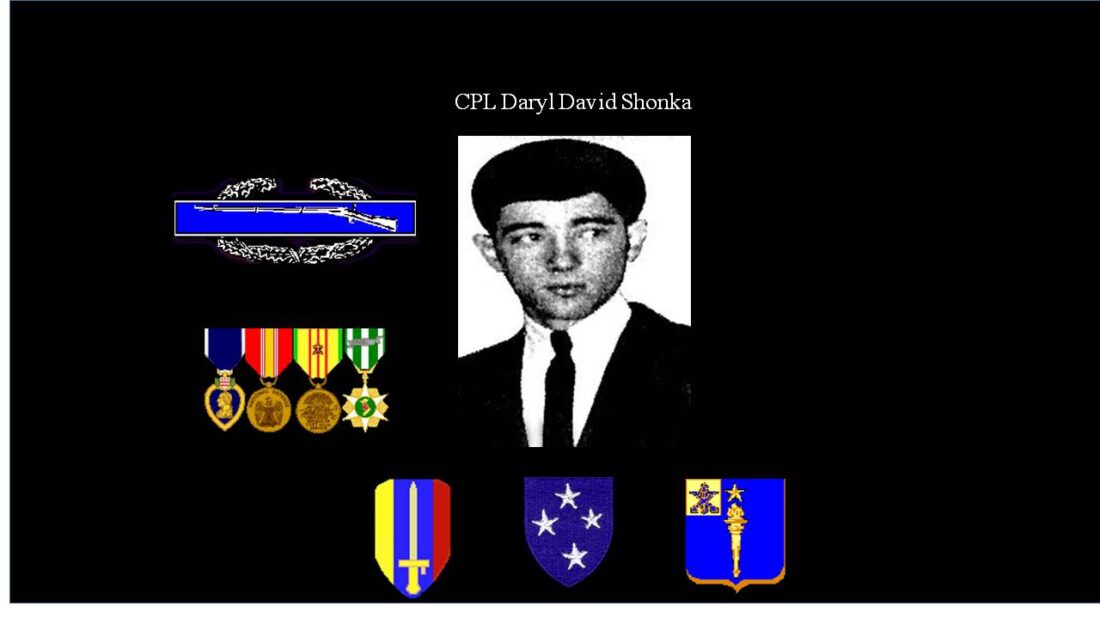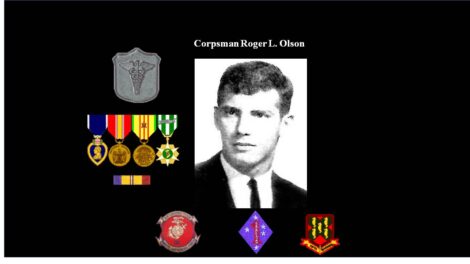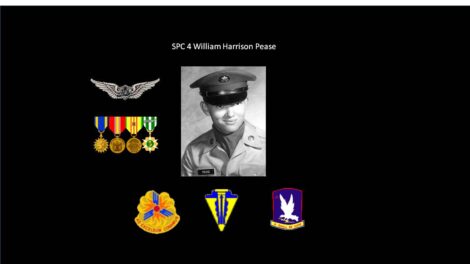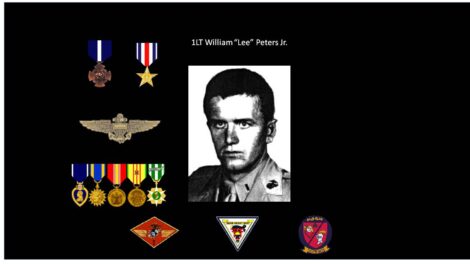Remembering the fallen
On 50th anniversary of Vietnam War’s end, we honor our heroes who gave ultimate sacrifice
- Leslie DeWayne Crouse —Fort Dodge
- Richard T. Flattery —Fort Dodge
- David Allen Fleskes —Fort Dodge
- Timothy Lee Green —Fort Dodge
- Terrence Hastings Griffey —Fort Dodge
- Donald Henry Holm —Fort Dodge
- Danny Wayne Johnson —Lehigh
- Donald Kay Lakey —Fort Dodge
- James Steven McGough
- Roger Lewis Olson — Fort Dodge
- William Harrison Pease — Fort Dodge
- William Lee Peters Jr. — Fort Dodge
- James Alphonse Rial —Barnum
- Daryl David Shonka —Fort Dodge
- Patrick Joseph Trotter —Fort Dodge
- Dennis James Yetmar —Clare

Leslie DeWayne Crouse —Fort Dodge
Today marks the 50th anniversary of the fall of Saigon, widely recognized as the end of the Vietnam War, and for the families and friends of 16 Webster County men who died for their country, it is far more than a historical event.
“On the anniversary,” said Rich Lennon, of Fort Dodge, a U.S. Army veteran of Vietnam and Iraq, “it is fitting that we honor not only those that lost their lives during the Vietnam War, but also to honor the families of those whose loved ones made the ultimate sacrifice in service to this great nation.”
Families like that of Raymond and Joyce Olson, who got that dreaded knock on their door on March 28, 1968, from their pastor and a military soldier, there with the news that their son Roger, a hospital corpsman with the U.S. Navy, was killed two days earlier when he stepped on a land mine.
At the time, Dayle Olson was a 15-year-old sophomore at Fort Dodge Senior High School and stood quietly in the background as they delivered word of Roger’s death at the age of 20.
“Fifty years!” said Olson, who lives in Merritt Island, Florida. “Today I look at the Vietnam War as a ‘different war.’ Now, 50 years later, I look back at this war that seemed to create a division in America. Some saw the war as necessary, others saw it as serving no real purpose. I don’t focus on those issues anymore. I focus on what this war did to over 58,000 families who had that knock on the front door with a military person standing on the other side holding a large brown envelope. As that envelope got handed to a family member, the words, ‘I am sorry for your loss,’ were quietly whispered.

Richard T. Flattery —Fort Dodge
“That image is cemented in my mind to this day! Families, like mine, were then and still today are faced with that division. Some saw this loss as a hero who had sacrificed their life for this country. Others saw it as part of ‘the unnecessary.’ I feel the same today as I did 50 years ago. Every person who was a part of Vietnam is an American hero who deserves our respect and gratitude.”
The names of the 16 Webster County men killed in the war are etched on the Vietnam Veterans Memorial in Washington and at the Terry Moehnke Veterans Memorial Park north of Fort Dodge. The photos with this story are also on display at Fort Dodge’s Walter Porsch Post 1856, Veterans of Foreign Wars.
The men and women who served in the Vietnam War era were faced with adversity both on the battlefield and at home, said Moehnke, a U.S. Navy veteran for whom the park is named.
“It was an unpopular war that had no clear objective for many in the Heartland,” he said. “I recall the turmoil on the college campuses and the somber scenes of caskets being unloaded off the transport planes. Men and women of my generation were called on to serve and the draft was disrupting plans for many of them. It was a war in a faraway place that most did not understand the significance of.
“Walking through Veterans Park provides an opportunity to reflect on the men and women who served and the impact of their service on their families and our community. The 16 young men from Webster County had their lives cut short, but there are hundreds more who returned and lived with their experiences with little support of their neighbors or our government. It took several years for the public to recognize that the battle didn’t end with their return. We can only hope that we learned to appreciate the efforts of others to preserve our freedoms.”

David Allen Fleskes —Fort Dodge
TJ Martin, academic dean — distance learning at Iowa Central Community College, headed a project in which students interviewed the families and friends of 55 men who died in the Vietnam War. They were from the nine counties that make up Iowa Central’s region — Buena Vista, Pocahontas, Humboldt, Wright, Sac, Calhoun, Webster, Hamilton, and Greene counties.
The result was a book titled, “Before They Were Soldiers,” and as its title states, the stories of those 55 attempted to capture the essence of their lives before they began their military service.
On April 22, the college hosted a book exhibition, attended by about 250 to 300 people, as a way of honoring the families and friends who contributed their stories to the project and who were presented a copy of the book.
“One thing we noticed from interviewing family members of those who died in Vietnam was that each of the families has a void or hole in their heart from the loss of their brother,” Martin said. “In two situations, we interviewed mothers and this was even more apparent in the information they gave us. Most of our interviews led to a situation where tears flowed down their cheeks as they remembered where they were when they got the news. Even though we did not ask that question, it always came up … I remember clearly the day or night that we got the call, or when the military car come driving up our lane, or when mom collapsed when they told us the news.”
Martin shared his personal experience of how such loss results in life forever changed, growing up in rural Palmer.

Timothy Lee Green —Fort Dodge
“In my situation, my mother gets married in the fall of 1967 and her husband is sent to Vietnam in January ’68,” he said. “He is killed in action May 29, 1968. A few years later she meets my dad, has us three boys and life marches on. However, if Henry Claussen does not die in Vietnam, I am not here today. The trajectory of life is forever altered by a war that is on the other side of the globe. One can overthink this, but it does not change the fact that this happens with each and every one of the guys who died over there.
“It is also true about those who came back altered from the young man who left compared to the man they were when they returned. In some cases, these guys had a full family when they were called to go over there. That changed how the kids had to live with that void of a dad and only had the memory of their dad instead of a father to play catch, wrestle, walk their daughter down the aisle, etc. One can really over think this … ”
Two of those who died are remembered at their respective high schools.
The memory of U.S. Air Force 1st Lt. Terry Griffey has been honored annually at St. Edmond High School since 1968 by recognizing a senior boy judged outstanding in athletics, academics, citizenship and leadership with the Terry Griffey Award. Griffey, a 1958 St. Edmond graduate, died in 1966, at the age of 25, when the F-4C Phantom fighter jet he was piloting burst into flames after a bombing run and disintegrated near Qui Nhon in South Vietnam. His body was never recovered.
In November 2019, a plaque was dedicated at Fort Dodge Senior High School in memory of 1st Lt. William L. Peters, a U.S. Marine killed in action on June 21, 1969, when his helicopter crashed during rescue operations in Quang Nam Province. He was awarded the Navy Cross and two Silver Stars for his heroism. The Fort Dodge Veterans Council presented the plaque on behalf of Peters, a 1961 graduate, and it is displayed in a place of honor at the high school.

Terrence Hastings Griffey —Fort Dodge
At the dedication, Peters’ sister Portia Peters Bauchens said:
“Lee Peters was a real war hero. He lost his life piloting a helicopter back into battle so that no wounded would be left behind. If you have been to the Vietnam Memorial in Washington, D.C., you know that uniformed men are there to help you find the name on the wall. When I asked for William Lee Peters Jr., he quietly asked ‘from Fort Dodge, Iowa?’ I surprised myself and burst into tears. I want Lee remembered as the kid from Fort Dodge who loved his family, loved to swim, loved his friends and to have fun … I hope the plaque at the high school will inspire kids to do their best when called upon. That was what Lee did.”
National Vietnam War Veterans Day is observed on March 29 — the date in 1973 when the last U.S. combat troops left Vietnam.
“To me when we (all combat forces) left Vietnam on 29 March is definitely more significant than when we left Vietnam in April of 1975,” Lennon said. “April of 1975 was a political date for the end of the war.”
Tom Dorsey, who served as an Army artillery forward observer in Vietnam in 1967, agrees: “For me the Vietnam War ended with the Paris Peace Accord in 1973 and the withdrawal of the U.S. combat forces. The RVN armed forces held on without U.S. assistance until the communist forces overran Saigon on April 30, 1975. As was everything else in the Vietnam war, the chaotic withdrawal of embassy staff and Vietnamese friendlies was controversial. Also subject to controversy was the resettlement of orphans as well as families.”

Donald Henry Holm —Fort Dodge
The last U.S. servicemen killed during the war, U.S Marines Charles McMahon and Darwin Lee Judge, died on April 29, 1975, in a North Vietnamese rocket attack one day before the fall of Saigon. Judge was a 19-year-old lance corporal from Marshalltown. In all, 55,280 U.S. service members died in the war — 869 of them from Iowa.
On May 7, the 27th Brushy Creek Area Honor Flight will transport 165 veterans to Washington to see the nation’s war monuments — two of them Korean War veterans and the rest Vietnam veterans, according to organizer Ron Newsum, who said, “To me, each flight makes me so grateful for what our country is and was and will be, one of freedom and respect.”
In his remarks at Iowa Central to families who lost loved ones in the Vietnam War, Martin said:
“For many of you, the pain is still raw. The absence is a constant ache. The questions linger, unanswered, in the quiet corners of your hearts. We understand that time may pass, but the love, the memories, the profound impact of your loss, remains. In a number of interviews that I assisted in completing, I witnessed this pain, agony, and that part of your heart that just didn’t heal.
“Your loved one — your brother, husband, son, father, or best buddy — answered the call to duty. They served with courage, with conviction, and with unwavering patriotism. They faced unimaginable challenges, endured hardships others can only try to comprehend, and in the end, they made the ultimate sacrifice. They gave their lives in service to their country, and their names are etched forever on a granite wall in our nation’s capital and American history.
“But their story doesn’t end there. It lives on in you. It lives on in the stories you tell, the memories you cherish, and the love that binds you together. They live on in the values they instilled, the lessons they taught, and the legacy they left behind.”

Danny Wayne Johnson —Lehigh

Donald Kay Lakey —Fort Dodge

James Steven McGough

Roger Lewis Olson — Fort Dodge

William Harrison Pease — Fort Dodge

William Lee Peters Jr. — Fort Dodge

James Alphonse Rial —Barnum

Daryl David Shonka —Fort Dodge
Patrick Joseph Trotter —Fort Dodge
Dennis James Yetmar —Clare


















